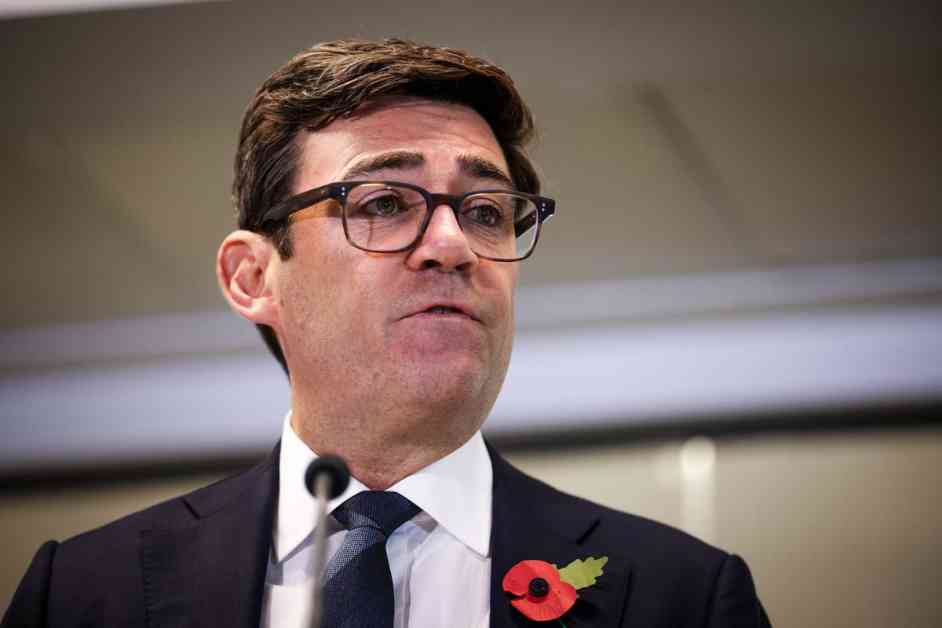Andy Burnham Urges Rachel Reeves to Consider Softening Cuts to Winter Fuel Payments
Greater Manchester Mayor Andy Burnham has called on Labour MP Rachel Reeves to reassess the proposed cuts to winter fuel payments for pensioners. As tensions rise within the Labour party over the issue, Burnham expressed concerns about the impact of the cuts on vulnerable older people.
Burnham, a prominent figure in the Labour party, criticized the previous Tory government for the financial challenges faced by the current administration under Sir Keir Starmer. Despite acknowledging the difficult financial situation, he urged Reeves to explore alternative options to mitigate the impact of the cuts on pensioners.
In a recent interview with BBC radio, Burnham stated, “It’s clear to me that the Government has inherited a challenging financial landscape from the previous administration. However, I believe there is room for flexibility in the implementation of the winter fuel allowance cuts.”
One of the key proposals put forward by Burnham is to consider raising the threshold for eligibility for winter fuel payments or introducing a taper system to ensure that more pensioners can benefit from the allowance. He emphasized the importance of addressing the reluctance of some pensioners to apply for pension credit due to various reasons.
Labour MPs Consider Revolt Over Winter Fuel Payment Cuts
The debate over the proposed cuts to winter fuel payments has sparked tensions within the Labour party, with some MPs considering a revolt in a crucial Commons vote. The decision to reduce winter fuel payments for older people not on pension credit or other means-tested benefits has raised concerns among Labour MPs about the impact on pensioners.
Former Cabinet minister Andy Burnham highlighted the financial challenges faced by the government and called for a reevaluation of the cuts to winter fuel payments. He stressed the need to protect vulnerable pensioners and ensure that they receive adequate support during the winter months.
Labour MP Rachel Reeves defended the decision to reduce winter fuel payments, citing the alleged £22 billion deficit in the public finances left by the previous Tory government. However, the proposed cuts have faced opposition from within the Labour party, with some MPs signing a motion to delay the implementation of the cuts.
Challenges and Concerns Over Winter Fuel Payment Cuts
The decision to reduce winter fuel payments for older people not on pension credit has raised a number of concerns and challenges. Critics argue that the cuts will disproportionately affect vulnerable pensioners who rely on the allowance to cover heating costs during the winter months.
There are concerns that the reduction in winter fuel payments could lead to increased fuel poverty among older people, particularly those living on low incomes. The potential impact of the cuts on pensioners’ health and well-being has also been raised as a major concern.
In light of these challenges, Greater Manchester Mayor Andy Burnham has called for a reevaluation of the cuts and proposed alternative solutions to ensure that vulnerable pensioners are not left without essential support. The debate over the winter fuel payment cuts highlights the complex issues surrounding social welfare and the need to prioritize the well-being of older people.
Government Response to Winter Fuel Payment Cuts
The government has defended its decision to reduce winter fuel payments for older people not on pension credit or other means-tested benefits. Chancellor Rachel Reeves has emphasized the need to address the alleged deficit in the public finances and make tough decisions to ensure economic stability.
Despite facing opposition from within the Labour party, the government has reiterated its commitment to implementing the cuts to winter fuel payments. Ministers have warned of likely tax rises and further public spending cuts in the upcoming Budget, highlighting the challenges of balancing the budget in a post-pandemic economy.
The decision to reduce winter fuel payments is expected to save around £1.4 billion this year, with an estimated 10 million pensioners no longer eligible to receive the allowance. While the government has highlighted the need to secure the foundations of the economy, critics argue that the cuts will have a detrimental impact on vulnerable older people.
In response to the concerns raised by MPs and advocacy groups, the government has stated that maintaining the triple lock on state pensions will provide additional support to pensioners. The triple lock guarantees that state pensions will increase each year by the highest of either inflation, wage increases, or 2.5 percent, ensuring that pensioners receive adequate financial support.
The government’s decision to reduce winter fuel payments has sparked debate and controversy within the political landscape, highlighting the challenges of balancing economic stability with social welfare priorities. As the debate continues, the impact of the cuts on vulnerable pensioners remains a key concern for policymakers and advocates alike.












